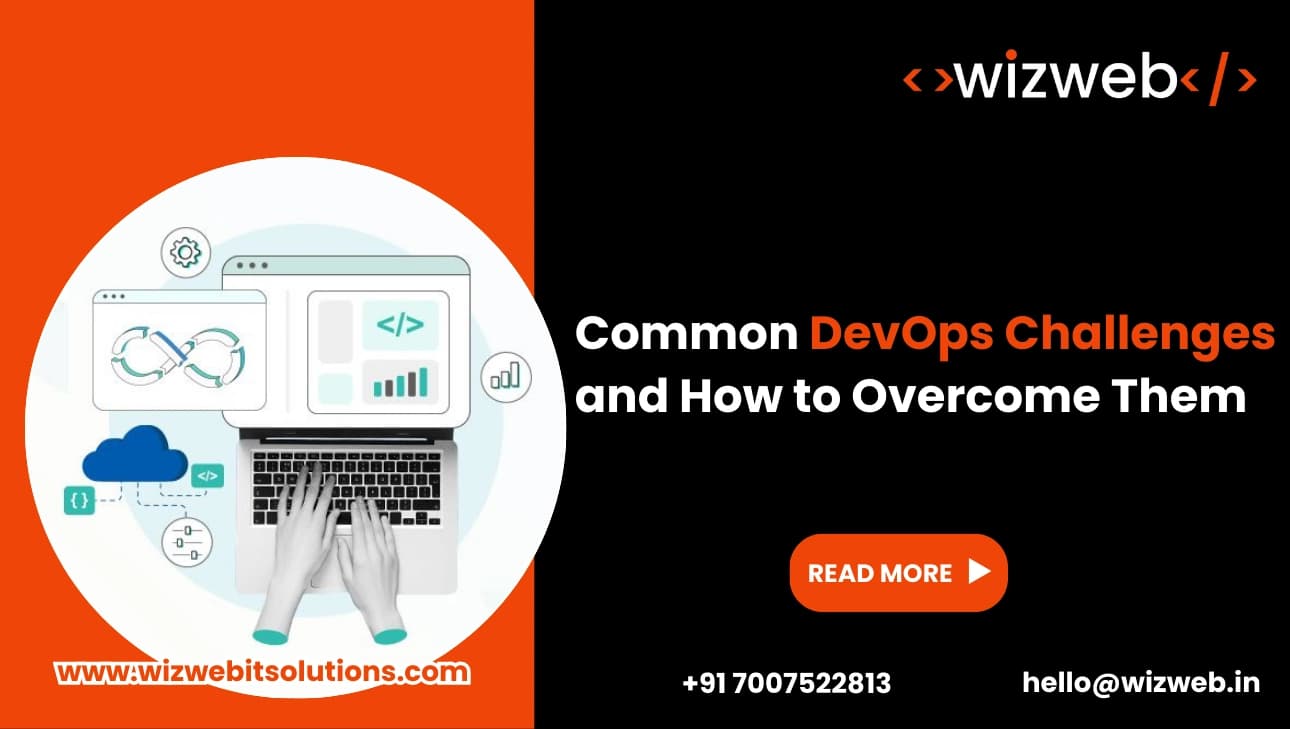Get in Touch
- Phone
+91 700 752 2813
- Email Now
hello@wizweb.in
Office No - 204 A-140, Sector 63 Road Noida, Uttar Pradesh 201301

DevOps promises faster releases, fewer outages, and happier customers. But in real life, teams face many DevOps Challenges that slow them down. This article will explain the common problems and give simple, practical ways to fix them. I’ll use everyday language and real examples so anyone can understand. I also mention where DevOps Services can help if you need outside help.
One of the biggest DevOps Challenges is people and culture. Development teams and operations teams often work separately. They have different goals, tools, and ways of working. This causes delays, blame, and unhappy teams. Breaking down silos means changing how people communicate, share work, and take responsibility together. Start small: form one cross-functional team for one product, hold shared standups, and run blameless postmortems after incidents. This helps people trust each other and move faster.
If your team needs help, DevOps Services or an external coach can run workshops, teach blameless practices, and help teams agree on shared goals.
Another common set of DevOps Challenges is tool chaos. Teams often pick different tools for CI/CD, code, monitoring, and security. Each tool can be useful, but too many tools make the workflow slow and confusing. The fix is to map your whole delivery process — from code commit to customer — and remove useless steps. Standardize on a smaller set of well-integrated tools and create reusable pipeline templates. Over time, this reduces confusion and onboarding time.
If building this by yourself is hard, platform-focused DevOps Services can build a “paved road” or internal platform that gives developers a simple, consistent path to production.
You can’t improve what you don’t measure. Many teams face DevOps Challenges because they lack clear metrics. The DORA metrics are a simple, proven set: deployment frequency, lead time for changes, change failure rate, and time to restore service. Start by measuring these and tracking them monthly. Small, steady improvements beat chasing instant fixes. These metrics show where your process is slow or risky.
Security is essential, but when security checks are stuck at the end, they become a blocker. This is a common DevOps pain: “DevOps Challenges” that come from heavy, late security reviews. The answer is to shift left — put security tools into the pipeline early. Use things like SAST, dependency scans, and container scanning in CI. Automate what you can, and only block builds for the most critical issues at first. Pair security and development so policies make sense and do not slow teams down.
DevOps Services with DevSecOps experience can help set up these checks and tune them to your team so security protects speed, not stops it.
Moving from a monolith to microservices brings new DevOps Challenges: distributed systems, data versioning, and more testing. Don’t rush. Use the “strangler fig” approach: move one small, clear part of the system at a time behind feature flags. Add tracing, centralized logging, and automated tests early. This reduces risk and gives you confidence as you move more parts. Platform engineering practices help here, too, by providing common foundations like service discovery and logging.
A system you cannot see will surprise you. Lack of observability is a silent but dangerous DevOps Challenges. Observability means collecting logs, metrics, and traces so teams can find and fix problems quickly. Define SLOs (service-level objectives) and create simple runbooks for alerts. Practice incident response with drills so teams know what to do. Good observability reduces time to recover and lowers stress during incidents.
As teams add ML features, they face extra DevOps Challenges: versioning datasets, tracking models, and reproducing results. Treat models as artifacts like code: version them, test them, and deploy with the same care. Try to unify ML workflows with your normal CI/CD pipeline so engineers and data scientists share a common process. This reduces handoffs and speeds up real-world ML delivery.
Here’s a simple plan to tackle DevOps Challenges:
DevOps Challenges touch people, process, tools, and security. The good news is most problems have clear, practical fixes. Start where it hurts most, measure results, and keep making small changes. If you need help, DevOps Services can bring experience and speed. Over time, your process will become smoother, your teams calmer, and your releases more reliable.